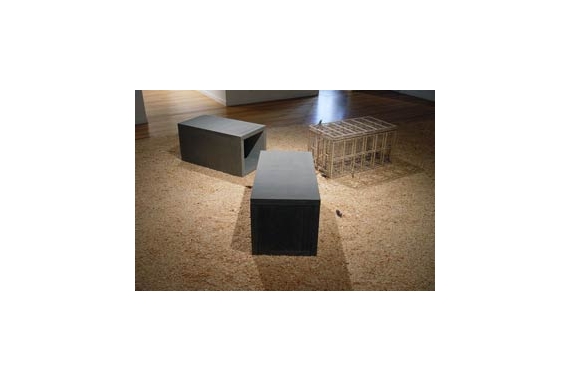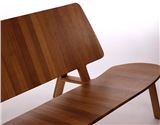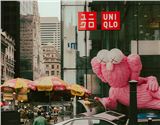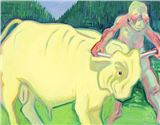Stephan Pascher: Who Got the Chickens
Who Got the Chickens is the title of Stephan Pascher’s latest show at Steven Wolf Fine Arts. It’s a lighthearted jab at a well-known artist whose
Liz Wing / The Brooklyn Rail
01 Mar, 2009

The front room is dramatically lit, dark with a spotlight on a triad of forms resembling a set of Donald Judd’s concrete sculptures in the outdoors of Marfa. Here, they’ve been replicated in miniature at about one-tenth their original size and laid on a bed of wood chips. Two are made of concrete, and one is made of wood and chicken wire, a few lonely feathers sticking out of the frame—an empty coop. In the back, a Discman plays a soundtrack of lulling night sounds of crickets and cicadas. It’s a tableaux which brings to mind a western noir: a moonlit set left over from the scene of a crime.
In the adjacent project room, eight C-prints of tumbleweeds line the walls. Each plant has been captured in flight along Highway 90, the main artery through Marfa, and exact coordinates of its location have been notated on the top of each print. Two small pieces of sculptural bricolage—more chicken wire, wood fragments, and industrial foam—stand atop pedestals.
A story written by Pascher unfolds in a supplementary booklet produced by the gallery; in it, internationally renowned sculptor James Dean and his wife Anne (“a veteran of the New York art scene … [who] messed around with art making herself before taking an interest in birds.”) star in a mysterious tale about the disappearance and death of Anne’s chickens. Possible perpetrators include a fox, an owl, a snake, and an intern from Juarez.
During a talk with Pascher and critic Kenneth Baker, the first question posed to the audience was “How many people here have been to Marfa?” After a show of hands, Baker commented, “Well then you know.” Which begs the question—Pascher’s question, posed by his installation: Know what? and What kind of place is Marfa, anyways?
For those who have “been there,” Pascher’s diminutive sculptures contrast with the physical memory of Judd’s immense forms, and for those who haven’t, his tumbleweed photographs are a good gag on the concept of site-specificity. Ultimately, however, what Pascher seems to be pointing out as problematic in Judd’s Marfa project aren’t the epistemological or phenomenological issues related to Judd’s utopian installation experience, but the absence of Judd’s reckoning with the broader cultural context.
Judd’s patrimony is emblematic of a super-empowered art market redefined by the concerns of Minimalism and Conceptualism. In a way, the Marfa compound is a model for many non-urban, private museums of contemporary art created by megacollectors; the space he defined, now changed with time, embodies the subtle commercial ideology of many museum and gallery spaces. Marfa is also a point on the map of art tourism, existing in relation to other art “destinations” ranging from fairs to architectural constructions and other artist-produced “site-specific” spaces.
The gentrification to which Marfa has been subjected as a result of Judd’s expansion project is an effect of the effort made to create and construct a legacy by both Judd’s foundations and the De Menils and Dia (it’s not insignificant to Pascher’s imaginative critique that Giant was filmed in Marfa). That Marfa is known by many as a sustained monument to Judd testifies to both his artistic vision and his autocracy: “This is how he would have wanted it” (see also the humorous WWDJD? bumper stickers).
Certainly, much about the current state of Marfa and the effects of his work on later artistic production are not what Judd would have wanted. Pascher’s show points out the limits to the control an artist has over his or her work, and the ineluctable transformations time has on a place (bird shit on the sculptures, residencies taken up by artists and the Border Patrol). His beef may not be with Judd per se, but with his denial that the terms of others should ever come to bear on his world.

 ARTISTS
ARTISTS







